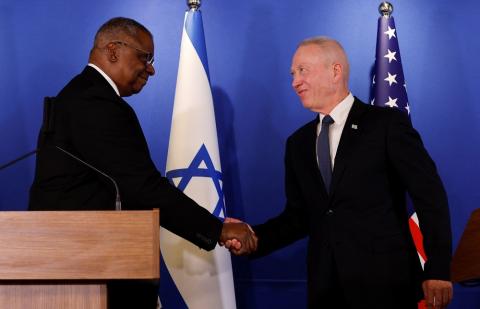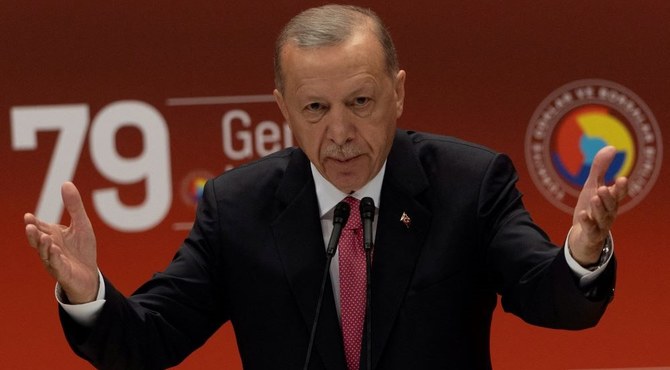
Turkey’s President Erdogan hinted at a looming operation against the PKK in Iraq’s Sinjar, saying, “We can come suddenly one night”
Ankara’s military action against PKK elements in 2020 was widely condemned by Baghdad because of aerial bombardment of border villages
ANKARA: Turkish Defense Minister Hulusi Akar’s recent visit to Iraq and Iraqi Kurdistan has sparked speculation about an imminent joint military operation between Ankara, Baghdad and Irbil inside Iraqi territory against the outlawed Kurdistan Workers’ Party (PKK).
On Friday, Turkey’s President Erdogan hinted at the looming operation against PKK in Iraq’s Sinjar, saying, “We can come suddenly one night,” using the same sentence he used during previous Syria offensives.
Ankara’s military action against the PKK in summertime both from air and ground was widely condemned by Baghdad because of the aerial bombardment of the border villages and the death of two senior Iraqi border officials. Both sides had to spend months on restoring good terms.
Since the early 1990s, Turkey has conducted several cross-border operations against the PKK in northern Iraq after its military targets were hit from PKK’s Iraqi bases.
OPINION
Sinem Cengiz
Turkey keen to expand its links with Iraq and KRG
Author
READ ARTICLE
On Monday, Akar visited Baghdad and met Iraqi officials before heading to Irbil where he talked with Kurdish officials, including Kurdistan Prime Minister Masrour Barzani and Kurdistan Region President Nechirvan Barzani on Tuesday.
Ankara is aiming to conduct an extensive offensive in the northern Iraqi town of Sinjar to target hideouts of the PKK, but this time on a tripartite basis rather than a go-it-alone one.
This issue was also raised during Akar’s meeting with Iraqi officials. Akar told Anadolu Agency that Baghdad pledged to remove the terrorists from Sinjar soon, while Turkey was also ready to assist it to do so if asked.
The Turkish defense chief also said they would maintain “mutual exchange of information and form suitable mechanisms to exchange information.”
He also thanked Irbil and Baghdad for their assumed disposition to exchange information on the PKK.
To secure its strategic interests, Turkey also intends to build more temporary military bases in northern Iraq in addition to the existing 10 in the region.
Yerevan Saeed, a Washington-based Middle Eastern affairs analyst, thinks that this could indicate preparations for massive military operations by Turkey in spring.
“At the moment, the weather and the topography is too treacherous for any successful military actions,” he told Arab News.
In the past, the PKK has often blamed the ruling Kurdistan Democratic Party (KDP) of the Kurdistan Regional Government (KRG) for sharing intelligence reports with Ankara about the group’s location and moves in the region, although the KDP, which is opposed to the presence of the PKK in northern Iraq, has firmly denied these allegations.
The KRG faces a balancing act because on one hand it refuses Ankara’s request for joining forces against the PKK, while on the other it has concerns about any intra-Kurdish fighting in the region.
PKK-affiliated groups, namely the Sinjar Resistance Units (YBS) that fought Daesh in Sinjar in 2014, are still active in the area, especially around Mount Sinjar and its surrounding areas. Ankara has targeted YBS’s members several times in the past.
While the PKK is listed as a terrorist movement by Washington, the YBS is not.
Bilgay Duman, coordinator of Iraq Studies at Ankara-based think-tank ORSAM, doesn’t expect an imminent tripartite operation in Iraq due to the disagreements between the parties about what constitutes a “terror group.”
“They still disagree about how to consider the PKK-affiliated groups in Iraq. On the other hand, realities on the ground are different. Therefore, I expect tripartite coordination with to-the-point operations against the zones where the PKK fighters are concentrated. It will be the best option for now,” he told Arab News.
According to Duman, Baghdad and Irbil have differentiated between the threats and they do not target those groups who do not pose domestic security challenges to them.
“The YBS is widely involved with the Iran-backed Hashd Al-Shaabi militia group, which funds and arms it,” he said.
Experts also note that the regional policies of the new US administration under Joe Biden will be a determinant for the dynamics within Iraq and the shape of the potential Turkish operation.
National Security Council coordinator for the Middle East and North Africa Brett McGurk’s partnership with local Kurdish groups in the region will also affect calculations.
Although Ankara considers any partnership involving the Kurds, be it in Iraq or Syria, as a menace, McGurk was against the Iraqi Kurds’ referendum on independence in 2017.
“The US is currently trying to eliminate the PKK, which it considers a terror group, and to strengthen the local Kurdish groups instead. On the other hand, as long as the PKK challenges the KDP’s authority and legitimacy in northern Iraq and targets big cities, we can expect a more aligned approach between Ankara, Baghdad Irbil,” Duman said.
However, for Saeed, it unlikely that the Iraqi or the Kurdish side becomes part of any Turkish military operations in the Kurdistan region.
“But sharing intelligence could be an element of such coordination and cooperation,” he said.












